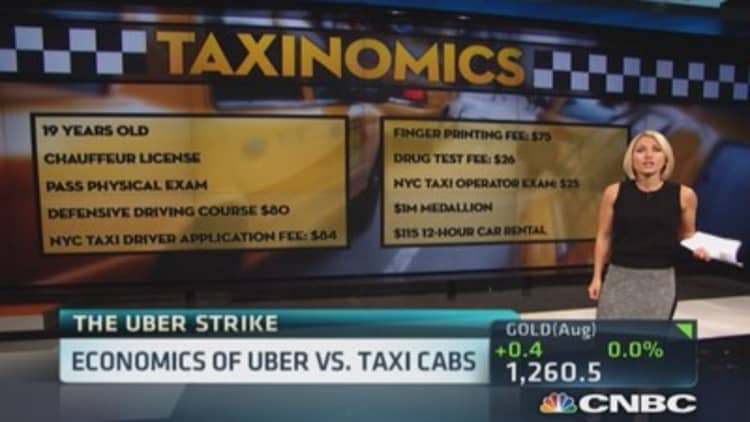Like many women in Kuala Lumpur, Melissa Ho used to avoid hailing taxis because of their woeful reputation for safety and reliability and the drivers' reluctance to use the meter. But now the corporate banker, who visits the Malaysian capital regularly, orders cars using GrabTaxi, known locally as MyTeksi. The mobile app checks drivers' backgrounds, estimates fares in advance and can even share details of the journey with friends or family.
"The only trusted taxi service [before] was via personal contacts [or] word of mouth," says the 37-year-old.
GrabTaxi, focused on southeast Asia, is part of a global wave of mobile apps, such as Uber, Lyft and Hailo, that are setting up alternatives to established – and usually well protected – taxi services.
Read MoreYo founder admits: Some people don't get it
It came into being by accident, says Anthony Tan, its Malaysian chief executive and co-founder, after an Indonesian friend on his Harvard MBA course needled him about taxis in Malaysia. "He said: your great grandfather was a taxi driver, your grandfather started the Japanese automotive industry in Malaysia, but your female friends suffer a lot of safety issues when taking a taxi. Why don't you do something about it?"
Mr Tan and Tan Hooi Ling, a Malaysian classmate at Harvard and former McKinsey consultant, worked on a business plan for a mobile app that would connect customers directly to taxi drivers via a phone, saving time and money and, ultimately, encouraging better customer service.
Read MoreThis app says 'yo' (that's all), and has raised $1 million
They were runners-up in Harvard's 2011 competition for start-up business plans. With capital from the business school and Mr Tan's "whole bank account", they launched the MyTeksi app in Malaysia in June 2012. Since then, it has launched in five more countries and 14 more cities, the latest being Jakarta, Indonesia. It has been downloaded more than 1.2 million times, and 250,000-plus people use it at least once a month.
Although GrabTaxi charges a commission for every booking, drivers like it because they no longer have to drive aimlessly through the traffic-clogged streets that are common in southeast Asian cities or sit in a queue at an airport or shopping mall.
As a privileged third-generation scion of one of Malaysia's wealthiest families, the 32-year-old had gone to business school to sharpen his skills for a senior role in Tan Chong Motor, the family business, local Nissan manufacturer and one of Malaysia's biggest distributors. But entrepreneurship classes and meetings with people such as Steve Chen, co-founder of YouTube, and Eric Ries, the "lean start-up" guru, opened his eyes to new opportunities – much to the displeasure of his family.
Read MoreCarservice app seeks to disrupt thedisruptors
"My family had a tough time understanding what I was trying to do and I don't blame them," says Mr Tan, sipping lemon tea at a Jakarta hotel. "Many people didn't understand. They kept saying that the taxi drivers are too stupid, that you can never collect from them or that passengers will never use it."

His family also worried about his safety in a region where the sector is under tight government control and dominated by tycoons with political links, retired generals and gangsters.
In fact, it was his family's long experience with Tan Chong Motor that prepared him for dealing with southeast Asia's messily interlinked world of business and politics.
While Uber and its peers thrive on being disruptive and the publicity from challenging regulators and monopolistic incumbents, GrabTaxi has taken a more co-operative approach, trying to work with governments and taxi companies.
Read MoreGet rid of cellphone robocalls with these apps
"My family have been doing business here for 60 years," says Mr Tan. "We've nowhere to run. This is our home. You think we can just get away [with] pissing off some big minister or his son? They will make sure we pay for it, one way or another." His comments hint at the toughness beneath the suave manners and appearance, dressed sharply as he is in smart-casual grey trousers and white shirt.
Ruthless in pushing out underperforming staff and drivers, he has tried to expand the company rapidly in what Jixun Foo of GGV Capital, one of his venture capital backers, calls a winner-takes-all industry. GrabTaxi is locked in a race for market share in the region with Uber and Easy Taxi, which is backed by Rocket Internet, the German tech clone group. Mr Tan declines to reveal revenues or other financial metrics.
More from the Financial Times:
Reliance seeks $500m from share issue
Banks to delay Fed capital submissions
Foxconnfaces investor challenge
It is being helped by GGV Capital, a Silicon Valley and Shanghai-based venture capital fund, which led a recent investment round of more than $15 million, and Vertex, the venture capital arm of Temasek Singapore's state investment company, which led an earlier round of more than $10 million.
With big names behind him, Mr Tan is not shy of lofty rhetoric: "We all believe that if we get this right, we can literally go into the history books." But Mr Foo, who sits on the board of Youku Tudou, a Chinese version of YouTube, and was an early backer of Baidu, the Chinese internet company, says he was attracted by Mr Tan's "workhorse" nature. "He has the benefit of pedigree but can get his head down, roll up his sleeves and get his hands dirty."
Read MoreUber's $90K salary could disrupt the taxi business
Mr Tan readily admits he has made mistakes, the biggest being insufficient spending on technology. In May, GrabTaxi's platform crashed because it could not cope with the surge in driver numbers, which currently stand at about 25,000. Mr Tan says there was soon a line of taxi drivers at the office, screaming at his customer service staff.
"We are literally their rice bowl, 80 per cent of their income comes from this and some of these taxi drivers are guys you don't want to piss off," he says.
That tech glitch taught him that he cannot afford to let down his guard at this crucial stage. Mr Tan cites Andy Grove, Intel's former CEO and his book Only the Paranoid Survive. "What we've built sounds glamorous but if you really want be hardcore and survive in this race, you need to be hyper paranoid and constantly thinking that the guy on your right is trying to murder you," he says.
Read MoreEurope's taxi drivers gear up for Uber revolt
Single and with little time to relax as he shuttles around southeast Asia, one of Mr Tan's few potential escapes from work is in the gym. But even then, he admits, he sometimes holds meetings while working out. Unable to think of any other pastimes, besides reading business books, Mr Tan suddenly looks glum and laments that he has spoken to his father once in the past three months and has not attended a family birthday for a year.
"You need to be cognisant before you take this journey that, for start-ups, if you want to win and get big fast, lots of personal sacrifices need to be made," he says.
Such tough talk must also be put into practice on the bustling but mean streets of southeast Asia. Recently, he dropped a taxi owner because of bad customer service despite pleas from the driver that he would be "cut into little pieces" by loan sharks.
Read MoreWhy Uber's $17billion valuation is justified
"Compassion is one thing but the quality of our platform is more important," Mr Tan says.
Opportunity from Hanoi to Jakarta
With limited mass public transport in most southeast Asian cities, many people rely on taxis to get to work, see friends or go to the hospital. But outside of prosperous, and well regulated Singapore, most cities are blighted by unscrupulous and inefficient taxi operators.
From Hanoi to Jakarta, incomes are rising rapidly and consumers are seeking better services as they look to make more taxi journeys.
Read MoreUbera risky ride for passengers, states warn
With widening use of cheap smartphones, fast-growing mobile internet use in this region of 600m people is enabling companies to break into highly fragmented industries such as taxis. GrabTaxi's Anthony Tan says that even in technologically advanced Singapore, only 6 per cent of cab rides are pre-booked and the proportion is lower in the rest of the region. The figures are 24 per cent in Shanghai and 28 per cent in Tokyo, he says.
Backer Jixun Foo believes the taxi app industry is a winner-takes-all race because of the momentum a market leader can build. Once there are enough drivers "we can create a better user experience because they rate the good drivers and we can remove the non-performing drivers."
Follow us on Twitter: @CNBCWorld




